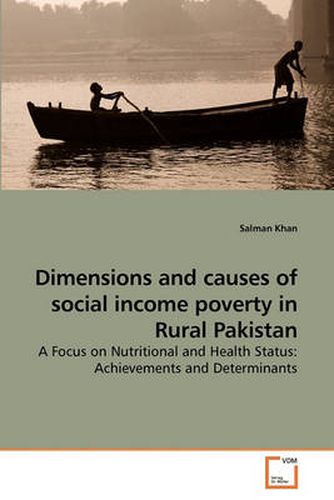Readings Newsletter
Become a Readings Member to make your shopping experience even easier.
Sign in or sign up for free!
You’re not far away from qualifying for FREE standard shipping within Australia
You’ve qualified for FREE standard shipping within Australia
The cart is loading…






This title is printed to order. This book may have been self-published. If so, we cannot guarantee the quality of the content. In the main most books will have gone through the editing process however some may not. We therefore suggest that you be aware of this before ordering this book. If in doubt check either the author or publisher’s details as we are unable to accept any returns unless they are faulty. Please contact us if you have any questions.
This thesis explores the dimensions and causes of social income poverty in Rural Pakistan, focusing on nutrition and health. The analysis also tests the ‘efficiency-wage’ hypothesis which links better health to better income via higher productivity. The results show that serious nutritional and health poverty exists within the sample. Other key findings are: firstly, the need for subsidised food and nutrient support programmes is emphasised; next, the potential of food prices as policy tools to improve health and nutrition emerges repeatedly; and thirdly, human capital (in particular own education and mother’s schooling), as well as village facilities such as health care, sanitation, and water supply, are consistently observed to boost nutritional and health status of both children and adults. The existence of an ‘efficiency-wage’ nexus is also supported by the findings. In general, the need for investment in human capital and social infrastructure emerges strongly, with clear intrinsic benefits, but also due to the spinoffs it generates in terms of higher potential levels of productivity, and hence overall economic development.
$9.00 standard shipping within Australia
FREE standard shipping within Australia for orders over $100.00
Express & International shipping calculated at checkout
Stock availability can be subject to change without notice. We recommend calling the shop or contacting our online team to check availability of low stock items. Please see our Shopping Online page for more details.
This title is printed to order. This book may have been self-published. If so, we cannot guarantee the quality of the content. In the main most books will have gone through the editing process however some may not. We therefore suggest that you be aware of this before ordering this book. If in doubt check either the author or publisher’s details as we are unable to accept any returns unless they are faulty. Please contact us if you have any questions.
This thesis explores the dimensions and causes of social income poverty in Rural Pakistan, focusing on nutrition and health. The analysis also tests the ‘efficiency-wage’ hypothesis which links better health to better income via higher productivity. The results show that serious nutritional and health poverty exists within the sample. Other key findings are: firstly, the need for subsidised food and nutrient support programmes is emphasised; next, the potential of food prices as policy tools to improve health and nutrition emerges repeatedly; and thirdly, human capital (in particular own education and mother’s schooling), as well as village facilities such as health care, sanitation, and water supply, are consistently observed to boost nutritional and health status of both children and adults. The existence of an ‘efficiency-wage’ nexus is also supported by the findings. In general, the need for investment in human capital and social infrastructure emerges strongly, with clear intrinsic benefits, but also due to the spinoffs it generates in terms of higher potential levels of productivity, and hence overall economic development.